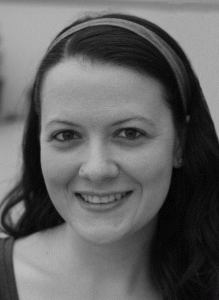 Editor Vrinda Pendred shares the importance of being entirely yourself, in all your relationships.
Editor Vrinda Pendred shares the importance of being entirely yourself, in all your relationships.
I’ve been with my husband twelve years, now, and we have a lively nine-year-old son. Things are good for us – very good. But for a long time, they weren’t, because aside from the usual issues of growing up, money problems and emotional baggage, I’ve been diagnosed with Tourette’s Syndrome, OCD, bipolar disorder, autism, ADHD and mild dyslexia – not to mention post-traumatic stress from being raised by a father I’m convinced has borderline personality disorder, on top of autism and extreme OCD. (I like to think everyone at my office regards me as charmingly eccentric, but I can’t verify this.)
I was diagnosed with Tourette’s when I was seven. A friend used to call me Bunny and point out every time I twitched my nose…and tell me to stop. I laughed it off and kept secret the fact that I’d torn the inside lining of my nose by scratching too much at an itch. It had bled and scabbed over, I kept picking at the scab, and now I felt the inexplicable need to stretch out my nose repeatedly to check if the scab had healed. It resulted in tearing open the wound over and over again with my twitching, and it was very painful. Yet somehow it felt satisfying. That, more than anything, I felt unable to share.
It wasn’t until I was 13 that I admitted to any of my strange thoughts and was finally diagnosed with OCD. Until then, I was convinced I was sick and crazy. I held my diagnoses close to my chest, terrified they meant I was broken, and certain all my friends would abandon me if they knew the depths of my insanity. This secret was eventually revealed in the most irrevocable way possible, when I developed symptoms of schizophrenia in response to prescribed medication and became convinced all of my friends were figments of my imagination – you heard me. What I didn’t know at the time was that you’re not supposed to give SSRIs to patients prone to manic episodes, as it can tip them over the edge, chemically.
See, I wasn’t diagnosed with bipolar disorder until I was well into my twenties. The diagnosis would have prevented a lot of heartache. I would have known, for instance, that the mood swings are made more extreme by pregnancy hormones. As I hadn’t yet been diagnosed, I spent the entirety of my pregnancy falling to pieces, screaming at my now husband, and nightly imagining all the ways I could kill myself. Visualising it brought relief, even though I had no intention of going through with it. Again, I felt unable to tell this to anyone. I genuinely feared the doctors would decide I was unfit for motherhood and take away my baby, so I hid the extent of my suffering for nine long months.
I was diagnosed with autism at the same time as bipolar. I’d suspected the ADHD a long time, so that came as no surprise. Dyslexia shocked me, as I’ve always been an avid reader, loved to write and I have excellent language skills. However, I have learned dyslexia is yet another of these conditions that is widely misunderstood, and I fit a less widely publicised description.
Returning to my marriage, my husband and I used to argue all the time, in our early years together. Now, we might have an argument once a year. What changed? Me.
That’s not to say my husband didn’t have his own challenges to overcome. He did. But there were many ongoing issues that were resolved simply by me learning to accept my diagnoses and stop keeping everything secret. I was so conditioned to hide myself, I would lock myself in the bathroom to cry in the dark, alone. I would smile and pretend everything was fine, because I was convinced no one would want to hear that I was suffering from intense muscle pain due to tics, or that I felt ugly and stupid because of the way my face kept contorting. When I failed socially, I believed people would think I was making excuses if I explained it as autism. I thought I’d be regarded as mad if I said I thought I was suffering a down-swing and expected to fall into a month-long state of depression, soon. And when those excuses sounded old, there was always the classic: I didn’t want to feel disabled. Talking about my problems would make it all too real and force me to acknowledge my lot in life.
These thoughts still run through my head, but these days, I choose to live by the principle: feel the fear and do it anyway. I’ve started answering my husband honestly when he asks how I am; if I’m in pain, I tell him. And you know what? He sympathises and lets me know he’s there. When I sense a mood shift I think will affect him, I warn him and he is understanding, accepting that at times I may be highly strung and at others, I may lie on the sofa watching TV every night for weeks, without motivation. When I don’t understand something social or I close off, I tell him I find it hard to open up and he respects that, gives me time – which, incidentally, encourages me to open up. Sometimes words get stuck in my throat and I can’t speak, if I’m seized by social panic. He helps me through those moments.
Of course, I’m fortunate beyond measure to have found such a husband. That said, it’s helped by the fact that he relates to some of my quirks, without qualifying for his own diagnoses. In fact, most of my close friends – including those who have stuck by me since we were little kids – have gone on to receive related diagnoses. My conclusion is that there must be certain personality traits we all share, as a result of our chemical imbalances. This allows us to connect on a deeper level, even when we seemingly have nothing else in common. We ‘get’ each other, as people. However, as children, we all argued like mad, too. Again, the difference has lain in maturing enough to talk about these things and try to understand each other. Before we developed that openness, it was easy to misunderstand each other’s quirks as deliberately hurtful. For instance, I used to think one of my friends was disinterested in what I had to say. I now know he’s very interested, but highly distracted because of his ADHD; so when I tell him something and he responds by changing the subject, I no longer take it personally. I know how hard he’s trying, and that he’ll address my comments in time, after he’s offloaded everything else fighting for attention in his head. He used to apologise profusely for seeming so rude, and get really down on himself. Now, we’ve learned to laugh about it and stop giving ourselves such a hard time for things we can’t really help.
Relationships are notoriously difficult to maintain when you’re what people like to call ‘neuro atypical’. But I don’t think they have to be. I think the secret, as in any relationship, is self-acceptance, honesty and trust. Be open about your challenges right from the start. If you experience rejection or general lack of support, it’s not a relationship worth pursuing. But if it is worthwhile – be it romantic or platonic – maintain that openness. Be wholly yourself, and return that acceptance when they’re open with you. Stop imagining your problems will burden your loved ones. They want to be there for you – as they know you want to support them.
If you have any tips for making relationships work, please share them by making a comment, below – and be sure to subscribe to this blog to read more insights and personal stories from our staff and our readers.
Vrinda Pendred
Editor & Founder
Vrinda Pendred is the Editor and Founder of Conditional Publications. Additionally, she does freelance editing and proofreading and provides private English tuition. She is also a writer, and you can learn more about her personal work here.
Vrinda has been diagnosed with Tourette’s Syndrome, Obsessive-Compulsive Disorder, ADHD, Autism and Bipolar Disorder. Her ambition is to help others with such conditions find their voice through creative writing, and spread awareness to the general public.
Be sure to read her contributions to Conditional Publications’ debut release Check Mates: A Collection of Fiction, Poetry and Artwork about Obsessive-Compulsive Disorder, by People with OCD.










Elisabeth Davies says:
I really liked your article Vrinda,
Thank you for not allowing your ‘neuro atypical’ behaviors to in any way impede your great writing ability!
Vrinda Pendred says:
Thank you for the feedback! I hope others take the same leap of faith in their loved ones and find that same closeness.
Helen Parker-Drabble says:
Thank you for sharing with such courage, honesty and integrity. I agree we need to be ourselves in all areas of our life and strive to live my life as authentically as possible. The world is a better place for you being in it.
Vrinda Pendred says:
Thank you, Helen 🙂